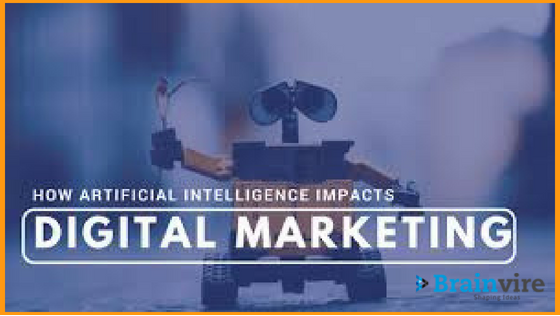In 2025, supply chain and logistics industries increasingly adopt AI-driven platforms to enhance efficiency, improve decision-making, and tackle complex challenges. These platforms utilize advanced technologies such as machine learning, predictive analytics, and automation to streamline inventory management, transportation planning, and risk assessment. Businesses leverage these solutions for real-time visibility, better forecasting, and optimized operational workflows.
This guide provides an in-depth look at the top supply chain and logistics platforms that can help companies remain competitive and achieve sustainable growth. The platforms highlighted here are tailored for various industries and offer scalability, integration capabilities, and user-friendly interfaces.
Factors to Consider While Choosing Supply Chain and Logistics Platforms
The proper supply chain and logistics platform is crucial for streamlining operations and maximizing efficiency. Here are key factors to consider:
AI and Predictive Analytics
Advanced platforms use AI and predictive analytics to forecast demand, optimize delivery routes, and preemptively address disruptions. Minimizing inefficiencies ensures smoother operations and cost savings.
Integration Capabilities
The platform should seamlessly integrate with your existing systems, such as Enterprise Resource Planning (ERP), Transportation Management Systems (TMS), and Warehouse Management Systems (WMS). This ensures smooth data flow and centralized control.
Scalability
Business needs to evolve, and so should your platform. Opt for a scalable solution that accommodates growth, manages increasing data loads, and supports complex operational requirements without compromising performance.
User-Friendly Interface
A simplified, intuitive interface reduces the learning curve, ensuring your team quickly adapts to the platform. Easy navigation improves user experience, which can enhance productivity and minimize errors.
Real-Time Visibility
Live updates on shipments, inventory, and supply chain performance are essential. Real-time visibility enables informed decisions, quick responses to changes, and improved customer satisfaction by offering accurate tracking.
By focusing on these factors, businesses can select a logistics platform that aligns with their operational needs, boosts efficiency, and provides a competitive edge in a dynamic marketplace.
Read More: How Can Data Science Help Supply Chain & Logistics Companies
Top Supply Chain AI and Logistics Platforms in 2025
Logiwa
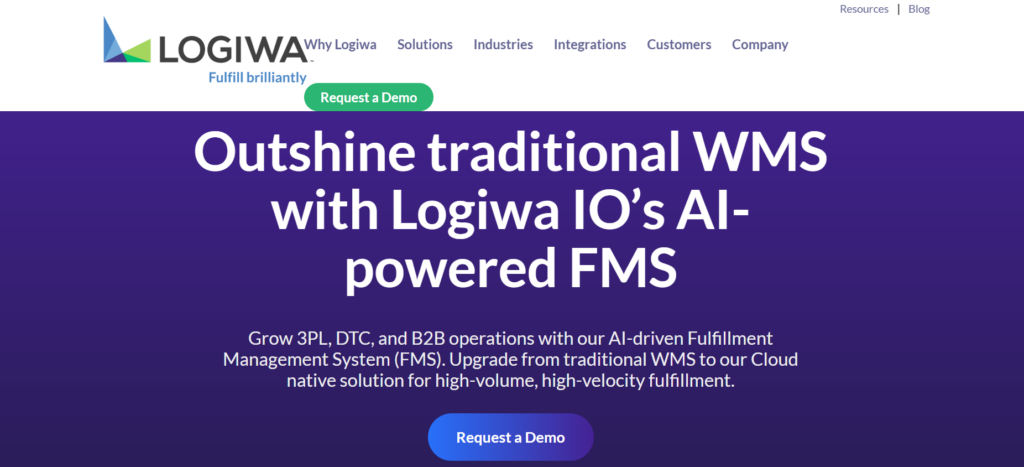
Logiwa is a leading cloud-based platform specializing in warehouse and inventory management. Its AI-powered tools streamline order fulfillment, demand forecasting, and stock control, making it a preferred choice for eCommerce businesses. The platform integrates seamlessly with various marketplaces, offering real-time inventory visibility and enhanced accuracy.
- Features: Real-time inventory tracking, AI-driven demand forecasting, and automated workflows.
- Scalability: Suitable for small to medium-sized businesses and enterprises.
- Industries Served: Retail, eCommerce, third-party logistics (3PL).
- USPs: Seamless integration with eCommerce platforms and real-time data accuracy.
Coyote Logistics
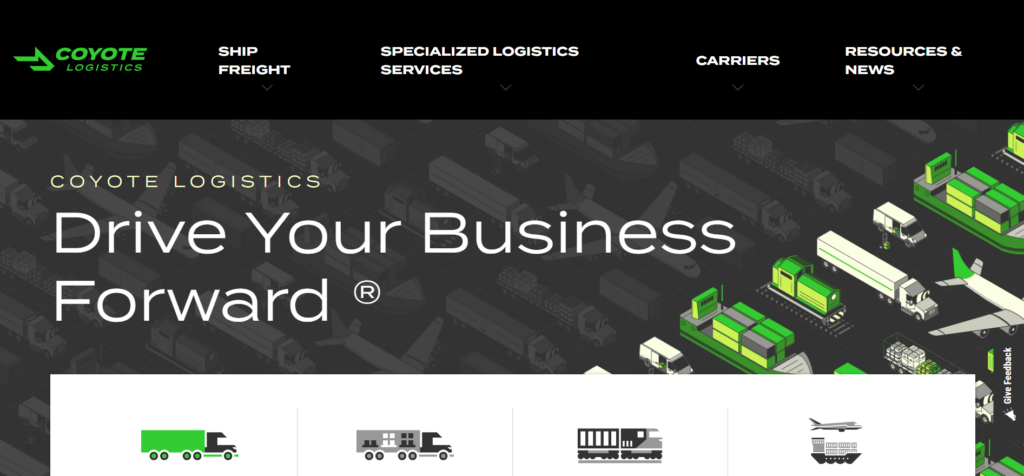
Coyote Logistics provides advanced freight and logistics solutions powered by AI. Its platform connects shippers and carriers, optimizing transportation networks and improving load efficiency. With predictive market analytics, Coyote enables businesses to adapt quickly to market fluctuations.
- Features: Load optimization, real-time tracking, and market forecasting.
- Scalability: Ideal for small freight businesses and large supply chain operations.
- Industries Served: Transportation, retail, manufacturing.
- USPs: Data-driven freight optimization and a broad carrier network.
Uptake
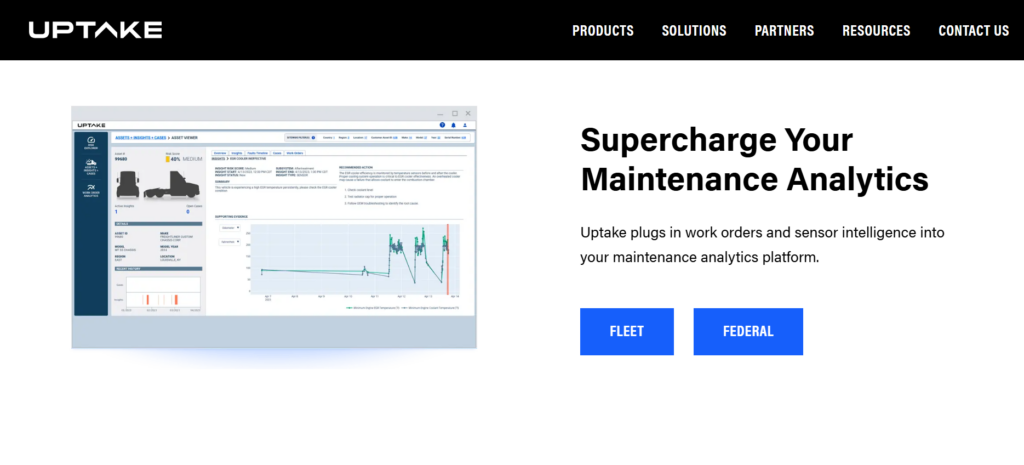
Uptake specializes in industrial AI solutions that focus on predictive maintenance and asset performance management. It helps logistics companies reduce downtime and enhance equipment efficiency through actionable insights.
- Features: Predictive maintenance, AI-driven insights, and operational optimization.
- Scalability: Suitable for enterprises managing large fleets or equipment.
- Industries Served: Logistics, manufacturing, utilities.
- USPs: Enhanced asset reliability through predictive analytics.
Symbotic
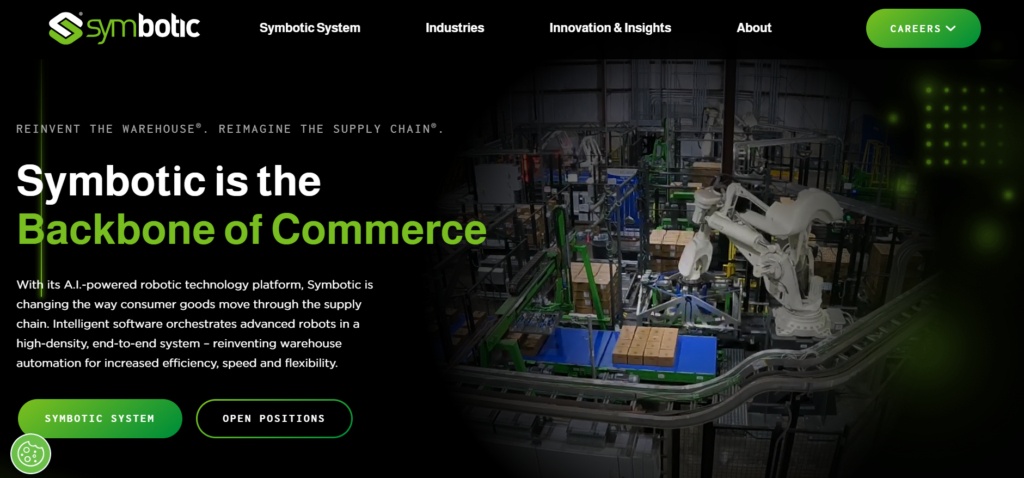
Symbotic offers cutting-edge warehouse automation solutions using AI and robotics. Integrating machine learning with robotics optimizes inventory management, order fulfillment, and warehouse operations, improving speed and accuracy.
- Features: Automated inventory management, robotics integration, and AI-driven workflows.
- Scalability: Designed for large-scale warehouse operations.
- Industries Served: Retail, wholesale, grocery.
- USPs: Robotics-driven automation and advanced inventory optimization.
Covariant
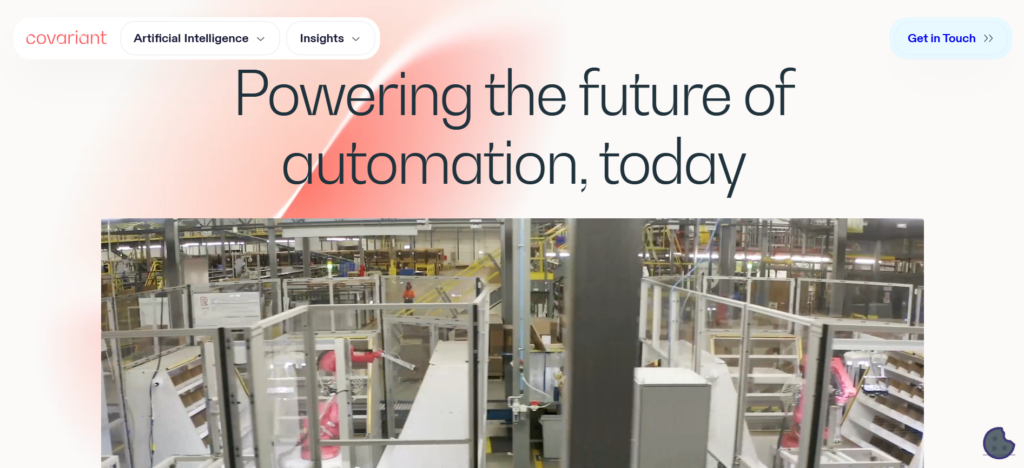
Covariant delivers AI-powered robotic solutions tailored for warehouse automation. Its adaptable systems excel at picking, packing, and sorting, ensuring efficiency across diverse inventory types. Covariant’s technology empowers businesses to automate repetitive tasks and boost productivity.
- Features: Machine learning for robotics, inventory handling, and task automation.
- Scalability: Perfect for warehouses with varied inventory needs.
- Industries Served: Logistics, retail, eCommerce.
- USPs: Advanced AI for robotic adaptability and efficiency.
Vorto
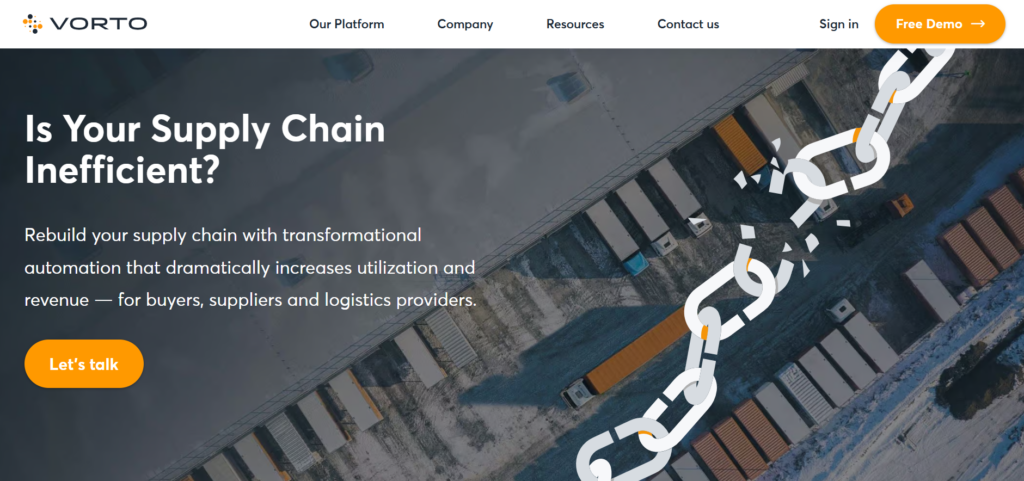
Vorto is an AI-driven platform that automates supply chain operations, including demand planning, sourcing, and logistics. Vorto ensures end-to-end operational visibility and efficiency by unifying procurement and logistics processes.
- Features: Automated procurement, AI-driven logistics planning, and real-time data.
- Scalability: Suitable for medium to large businesses.
- Industries Served: Manufacturing, logistics, distribution.
- USPs: Unified supply chain automation with real-time optimization.
FourKites

FourKites offers industry-leading supply chain visibility solutions. Combining real-time tracking with predictive analytics enables businesses to streamline transportation and mitigate risks efficiently.
- Features: Predictive ETAs, multi-modal tracking, and risk analytics.
- Scalability: Ideal for global supply chain operations.
- Industries Served: Transportation, retail, consumer goods.
- USPs: Industry-leading predictive visibility and risk mitigation.
Everstream Analytics
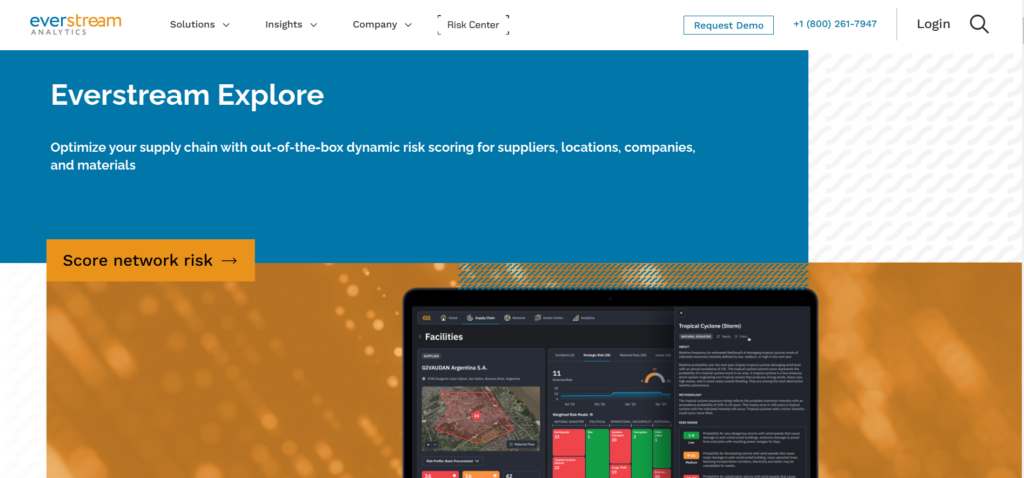
Everstream Analytics provides proactive supply chain risk management solutions. Using AI, it predicts potential disruptions and offers strategies to minimize risks, ensuring smoother operations and improved resiliency.
- Features: Risk prediction, disruption monitoring, and scenario planning.
- Scalability: Suitable for businesses of all sizes managing complex supply chains.
- Industries Served: Manufacturing, logistics, consumer goods.
- USPs: Comprehensive risk analysis and proactive mitigation.
TransVoyant
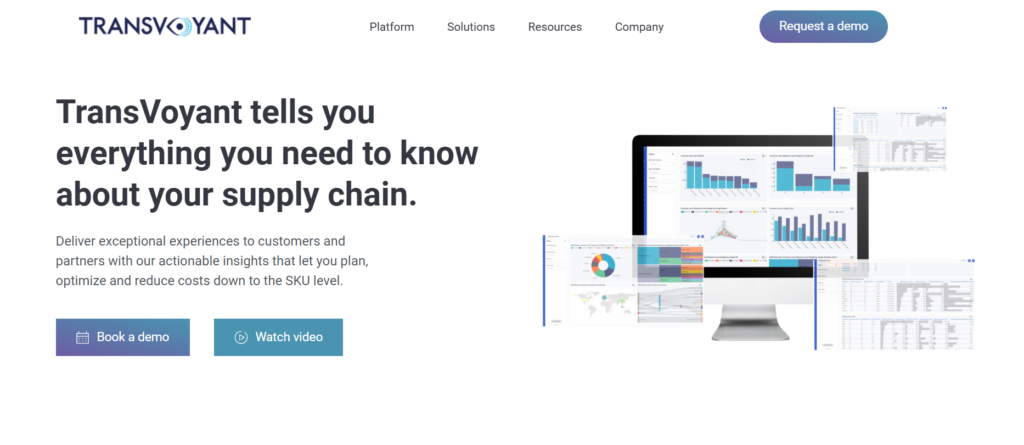
TransVoyant uses live data and AI to deliver real-time insights into supply chain operations. It empowers businesses to make proactive decisions through advanced predictive and prescriptive analytics.
- Features: Live data tracking, demand forecasting, and analytics.
- Scalability: Best for businesses managing dynamic supply chains.
- Industries Served: Logistics, manufacturing, retail.
- USPs: Real-time intelligence for proactive supply chain management.
Project44
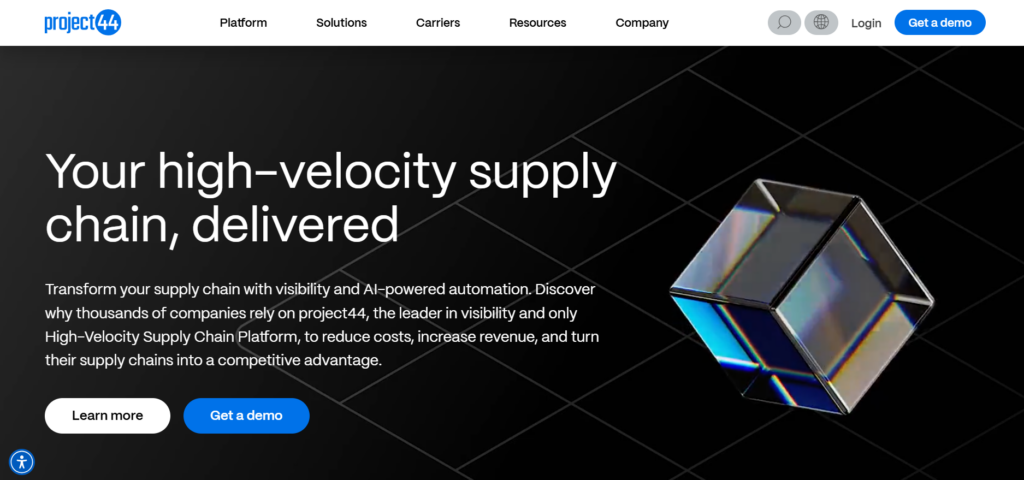
Project44 is a trusted name in supply chain visibility and analytics. It integrates seamlessly with TMS, ERP, and WMS platforms to provide accurate real-time data and enhance operational efficiency.
- Features: Multi-modal tracking, predictive analytics, and supply chain visibility.
- Scalability: Designed for small to large enterprises.
- Industries Served: Transportation, retail, eCommerce.
- USPs: Best-in-class predictive visibility and integration capabilities.
Conclusion
The supply chain and logistics landscape in 2025 is marked by rapid technological advancements, with AI-driven platforms leading the charge. The featured platforms empower businesses to optimize workflows, improve accuracy, and enhance customer satisfaction through automation and real-time insights.
Investing in a robust AI-driven platform is now optional but essential for staying competitive in a fast-evolving market. By selecting the right tool tailored to your business needs, you can future-proof operations, mitigate risks, and drive sustainable growth.
Read More: How Combination of BigCommerce and AI Helps E-commerce
Frequently Asked Questions (FAQs)
AI helps optimize demand forecasting, inventory management, route planning, and risk mitigation by providing actionable insights and automating workflows.
Yes, many platforms offer scalable solutions designed for businesses of all sizes, ensuring they cater to the needs of both small and large operations.
They improve decision-making, enhance visibility, reduce costs, and increase operational efficiency through automation and real-time insights.
Evaluate factors like integration capabilities, scalability, industry focus, and specific features like predictive analytics and automation to find a platform that aligns with your business goals.
Related Articles
-
The Impact Of AI On Digital Marketing
Talking About The Impact Of AI On Digital Marketing, We’ve already crossed the mid of 2018 and I’m sure none till now is unaware of the buzz artificial intelligence has
-
How Combination of BigCommerce and AI Helps E-commerce
In the rapidly changing e-commerce world, businesses constantly strive to enhance consumer experiences, generate more money as well as make their processes less complicated. BigCommerce is one of the leading
-
How AI Is Transforming The Online Shopping Experience
AI-driven customer service refers to applying artificial intelligence technologies to automate and improve the customer support experience in ecommerce. Providing outstanding customer service is critical for business success in today’s

